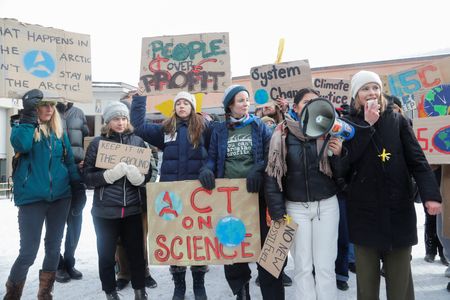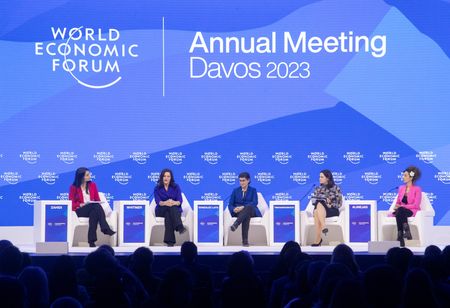By Mark John and Brenda Goh
DAVOS, Switzerland (Reuters) – The year ahead looks better than feared for the global economy but remains fraught with risks including escalation of the conflict in Ukraine and the emergence of a transatlantic trade war, the World Economic Forum’s final panel concluded.
International Monetary Fund (IMF) Managing Director Kristalina Georgieva told the Davos audience that what had improved was the potential for China to boost growth and that the IMF now forecast Chinese growth of 4.4% for 2023.
While that was likely to prompt the IMF in coming days to upgrade its current forecast of 2.7% growth for the year ahead, she cautioned against expecting any “dramatic improvement” on that figure.
One risk tied to China’s re-opening, with its potential to heat up global demand and prices for energy, was that it triggered a new wave of inflationary pressures only months after this bout had reached its peak.
The week-long meeting was dominated by debate on a brewing dispute between the United States and Europe on subsidies for green energy transition, the growing debt distress in developing nations and abundant geopolitical risk around the planet.
“My deepest concern is clearly the war in Ukraine,” French Finance Minister Bruno Le Maire told the panel, warning that escalation was possible while also arguing it had pushed the European Union to become more of a political force in its resolve to remain supportive of Ukraine.
Le Maire, who is involved in efforts to resolve the dispute with Washington over a $369 billion, state-subsidised climate transition which Europe says is anti-competition, said the plan must be compatible with similar efforts across the world.
“The key question is not China First, U.S. First, Europe First. The key question for all of us is Climate First,” said Le Maire, who will travel to Washington in coming days alongside German officials to discuss possible changes to the U.S. plan.
Former U.S. Treasury Secretary Larry Summers said the Biden administration subsidies package and the planned effort by Europe on tackling climate change at least represented a long overdue stepping-up of activity on the green energy transition.
“A subsidy war about a very good thing is good,” he told the panel. “That is a very healthy kind of competition relative to all the kinds of competition the world has seen,” he said, urging fair competition that did not “wall off others and try to take down others”.
Wall Street executives in Davos said pessimism had eased as economies in the U.S. and Europe stayed resilient and China loosened its COVID-19 policies.
Describing 2022 as a “weird, weird year when you look at it”, European Central Bank (ECB) President Christine Lagarde called on governments to ensure that fiscal policy did not make the job of central bankers harder by heating up the economy.
“‘Stay the course’ is my mantra on monetary policy,” she said, reaffirming that the ECB planned to continue tightening for as long as needed.
(Reporting by Mark John in Davos; Editing by Alexander Smith)


